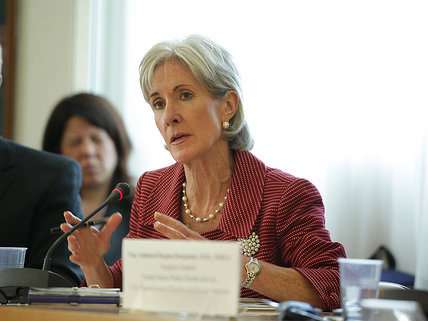White House in Obamacare Panic Mode? Administration Announces Steps to Maintain Insurance Coverage as Worries About Disruptions Mount

How anxious is the Obama administration about the health care law's effects on insurance coverage? For the last few days, speculation has increased about the possibility that the law could actually result in a net loss of coverage at the beginning of next year—with more people losing existing insurance as a result of cancelations than have signed up for new insurance plans under the law. An announcement this afternoon strongly suggests that the administration is more than a little bit concerned about this possibility as well.
The Department of Health and Human Services said this afternoon that it will extend coverage options for individuals currently enrolled in the law's temporary high-risk pool program through the end of January, instead of allowing the program to end on December 31 as originally planned. It will also require private insurers selling policies in the law's insurance exchanges to accept payment up until December 31 of this year for coverage than begins January 1.
In addition, HHS said it would "strongly encourage" insurers to take other "transitional" steps over the next month as well—steps like accepting partial pre-payment for coverage that begins on January 1 as a "down payment" in lieu of full payment prior to the start of coverage and allowing people who sign up after the December 23 deadline to begin coverage on January 1. HHS also said it hoped insurers would accept out of network providers as in-network for "acute episodes" or in cases in which a provider was listed in an insurer's enrollment directory but dropped out after an individual's enrollment date.
On an afternoon conference call about the changes, the administration even suggested that insurers should consider accepting as enrolled anyone who has signed up for a plan by December 23—even if the person in question has not paid the first month's premium at all. Payments could be made after January 1, and after coverage kicked in.
What does it mean to "strongly encourage" insurers to take these steps? It's difficult to say for sure. But probably it means that the administration is worried about what's coming, and plans to blame insurers who don't take the administration's encouragement when the bad news arrives.
It's clear from the announcement that federal officials are worried, even panicked, about what comes next. Asked on the conference call whether the administration was confident that more people will gain coverage than lose it come the beginning of next year, a spokeswoman for the Centers for Medicare and Medicaid Services dodged the question—responding that it's important to remember that there are still three more months in the open enrollment period, and that the real goal is to ensure a viable demographic mix of enrollees on a market by market basis. In other words, the administration isn't saying that more people will lose coverage than gain it comes January 1. But they're not saying that won't happen either.
HHS Secretary began today;s call by calmly asserting that for millions of people, the "security of health coverage is finally within reach," which in the upside-down world of the administration is as telling a sign as any that it isn't. The administration is trying to put a happy face on its desperation, but the lack of confidence implied by today's announcement is not what anyone would call strongly encouraging.


Show Comments (131)